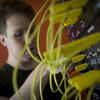Electrical Engineering Master of Science
The Electrical Engineering Master of Science is an interdisciplinary, practice-oriented program in the College of Engineering. Benefit from hands-on research opportunities, and investigate the mechanisms that support the technological fabric of our lives, including computers and the internet.
As a master’s student, you’ll enjoy a flexible range of courses with many opportunities for electives to fit your particular academic and professional interests. Work closely with an advisor to chart a personalized course through the program.
The small size and welcoming environment of the Department of Electrical and Computer Engineering and its faculty make for a uniquely engaged learning experience. Professors operate according to an open-door policy, so you can visit them regularly outside of class to brainstorm independent research projects, discuss questions or talk through issues of professional development. The diverse personal and professional experiences of the student body add value to class projects, discussions and group work.


